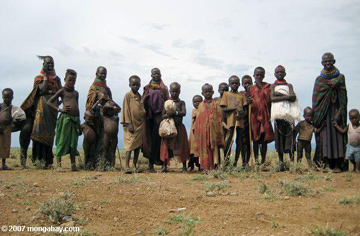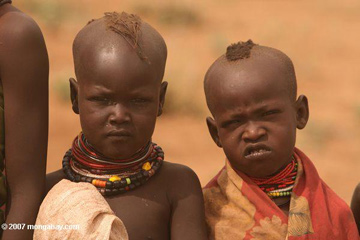Worsening climate change will likely lead to increased global conflicts
Climate change may increase global conflict
Jeremy Hance, mongabay.com
August 25, 2008
|
|
The signs of a warming world are everywhere: birds are migrating with changing temperatures; coral reefs are dying out due to bleaching; warmer winters are allowing beetles to devour Canadian forests; and the Northwest Passage has opened for the second year in a row.
While scientists work to understand how climate change is affecting the world’s ecosystems, others are attempting to predict how societies may respond. Jurgen Scheffran, a scientist with the Program in Arms Control, Disarmament and International Security at the University of Illinois, believes a warmer world will lead to an increase in armed conflicts. He concludes that societies stressed by increased competition for natural resources are more likely to engage in warfare.
The most significant cause for conflict would be threats to food and water security. “Most critical for human survival are water and food, which are sensitive to changing climatic conditions,” Scheffran said. In his survey, Scheffran noted that the number of areas susceptible to drought will rise, and freshwater sources from glaciers in places such as the Himalayas and the Andes are likely to decrease. In what he calls a “cascading effect” resource-stressed societies will be less likely to withstand other climate change fallouts, such as intensifying natural disasters, economic depression, and a rise in environmental migrants. To illuminate this point, Scheffran references both historical and contemporary examples.
 Turkana children in the arid Kenya-Sudan border region. |
The conflict in Darfur, which has been going on since 2003, is seen by many researchers and government officials as being directly related to climate change. Scheffran says that Darfur’s “ongoing conflict was aggravated since droughts forced Arab herders to move into areas of African farmers.” Scheffran believes that Africa is particularly prone to the worst effects of climate change: “large areas of Africa are suffering from scarcity of food and fresh water resources, making them more vulnerable to conflict.” Scheffran also cited the Middle East, Central Asia, and South America as already facing societal stress due to climate change.
Conflicts related to climate change have also occurred in the not-too-distant past. “The so-called ‘Little Ice Age’ in the northern hemisphere a few hundred years ago was caused by an average drop in temperature of less than a degree Celsius,” he says. “The consequences were quite severe in parts of Europe, associated with loss of harvest and population decline. Riots and military conflicts became more likely, as a recent empirical study has suggested.”
This pattern can be seen throughout our past. “History has shown how dependent our culture is on a narrow window of climatic conditions for average temperature and precipitation,” Scheffran says. “The great human civilizations began to flourish after the last ice age, and some disappeared due to droughts and other adverse shifts in the climate.” For example, regions of the Sahara used to be far wetter and greener than they are today, some supporting large populations of hunters and fishermen before being swallowed by the desert. In Iraq great ancient metropolises, such as Ur, now sit on dry parched earth, abandoned 2,500 years ago due to droughts.
 Turkana children in the arid Kenya-Sudan border region. |
However, Scheffran does not believe that contemporary societies have to follow such bleak examples: “the challenge is to slow down the dynamics and stabilize the climate system at levels which are not dangerous.” He adds that “the seeming conflict between environment and the economy will be best overcome with the recognition that protecting the climate in the best interest of the economy.”
Scheffran sees signs of optimism in the attention placed on climate change (compared even to a few years ago), in grassroots movements around the world, and in both U.S. residential candidates recognizing climate change as a serious economic, social, and environmental threat.
“Although climate change bears a significant conflict potential, it can also transform the international system toward more cooperation if it is seen as a common threat that requires joint action,” Scheffran says, citing the conference at Bali in 2007 as an example of the beginnings of international cooperation.
Perhaps instead of inciting conflicts, climate change could actually help bring the world together.